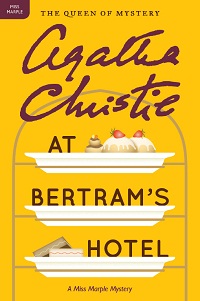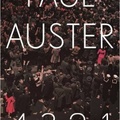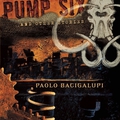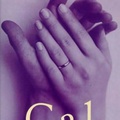Agatha Christie: At Bertram's Hotel
 It's been a while since I read anything by Agatha Christie, but I remember when I was a great Christie reader as a teenager, I always used to like her Poirot stories better than the ones with Miss Marple. I didn't originally know whether At Bertram's Hotel is a Poirot, a Miss Marple or a standalone story, but I liked the title (which is very often enough for me to get a craving for a book), so I read it, even when I realized that this is a Miss Marple mystery. And actually – I really liked it. But of course, Miss Marple doesn't have much to do with me liking this novel, because this clever, mistrustful but not at all cynical old lady – who solves mysteries in quite an off-hand manner – can hardly be considered the most important character in this novel.
It's been a while since I read anything by Agatha Christie, but I remember when I was a great Christie reader as a teenager, I always used to like her Poirot stories better than the ones with Miss Marple. I didn't originally know whether At Bertram's Hotel is a Poirot, a Miss Marple or a standalone story, but I liked the title (which is very often enough for me to get a craving for a book), so I read it, even when I realized that this is a Miss Marple mystery. And actually – I really liked it. But of course, Miss Marple doesn't have much to do with me liking this novel, because this clever, mistrustful but not at all cynical old lady – who solves mysteries in quite an off-hand manner – can hardly be considered the most important character in this novel.
The main character is Bertram's Hotel itself: a respectable, subtly elegant hotel with a gently luxurious early 20th century atmosphere – the perfect choice for impoverished aristocrats who like to pretend that their past wealth is still intact; for silly but lovely old clergymen; and for old-fashioned ladies and gentlemen looking for a place where they can indulge in some pleasant, harmless nostalgia for things which might never have existed in the first place. Bertram's Hotel is a place of make-believe, a miniature Disneyland in the middle of England in the 1950s – everything here is fake, everything here is a copy, or a sentient or insentient piece of decor. The world's most perfect hotel maid is in fact not a maid but a talented actress; and the impoverished aristocrats get their afternoon tea for the price of the 1900s because even if this is a loss of income for the owners of the hotel, their presence amply compensates for this – they create an elegant, distinguished atmosphere, valued greatly by the paying guests of the hotel. Moreover, the undeniable luxury offered by the hotel is made in such a way that the guests doesn't actually consider it luxury; and perhaps the hotel's famous seed-cakes, perfect muffins and real red strawberry jams are all made of plastic.
It's highly unlikely that someone runs a luxury hotel which loses massive amounts of money just out of pure philanthropy, for good old nostalgia's sake. This probably didn't often happen at the beginning of the 1900s (which was a – presumably – more peaceful and friendly era), and it's even more unlikely that someone in the 1950s would do this when the aristocratic old world is quickly coming to the end: England is plagued by crime; wayward young girls fall for singers with long hair and for those violent types with race-cars; and it's simply impossible to find a decent dish-towel with a sensible pattern. So naturally, the members of the police investigating a series of crimes and Miss Marple (who's staying at Bertram's Hotel) all ask: why can it be in someone's interest to recreate England as it was in the 1900s? And as more and more strange events occur in and in the vicinity of Bertram's Hotel (an absent-minded clergyman goes missing from the hotel; seedy characters seem to be going about the place; etc.), it slowly emerges that below the perfect, shiny surface of Bertram's Hotel there are secret dealings going on – and of course, there's also a murder, but that doesn't interest me much.
I don't read murder stories anyway because I'm interested in the murder itself, and in this novel, the plot line following the murder is especially flimsy and not too important. Here there are only several smaller mysteries which are often solved in a very anti-climactic way, so At Bertram's Hotel is by no means the most exciting crime story of the world. But this is not a problem at all, because despite the lack of thrilling crimes, the novel is very atmospheric and ominous. The hotel – the main character – seems to be a living entity, and even though nothing fatal happens within its walls (only on the street, close to the hotel), it still gives me the creeps with its eerie strangeness and its fake nature.
Moreover, Agatha Christie is not only good at creating an oppressive, uncanny atmosphere – she also writes very well. It's a pleasure to read her wonderful, toned-down, gentle-yet-ironic, prettily ceremonious English-countryside sentences, and it's quite an experience to read her descriptions of England in the fifties – which is so very much different from the fake 1900s England as recreated in Bertram's Hotel. And also – the way she writes about the good old seed-cakes and wonderful, real jams of Bertram's Hotel makes my mouth water, and I would be absolutely delighted to taste all these wonders – it's sad they don't actually exist.





